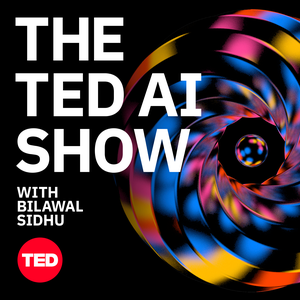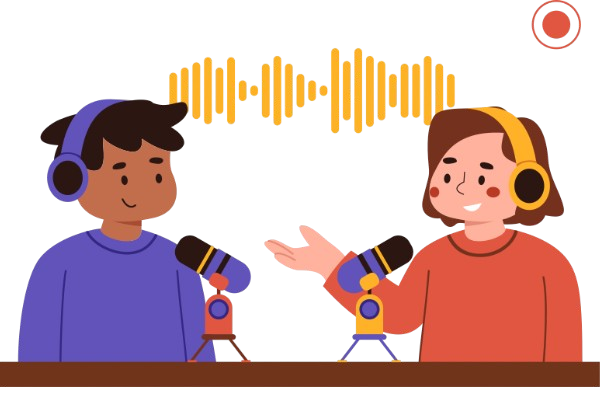The TED AI Show Zusammenfassung
Erhalte die neuesten Folgen und Zusammenfassungen von The TED AI Show direkt bei uns.

Der The TED AI Show Podcast
Der Podcast "The TED AI Show" bietet eine faszinierende Reise in die Welt der künstlichen Intelligenz, moderiert von dem kreativen Technologen Bilawal Sidhu. In einer Zeit, in der sich die Grenzen zwischen Science-Fiction und Realität immer weiter verwischen, lädt Bilawal Sidhu einige der klügsten Köpfe unserer Zeit ein, um über die transformative Kraft der KI zu diskutieren. Von führenden Experten über visionäre Künstler bis hin zu investigativen Journalisten – jeder Gast bringt seine einzigartige Perspektive auf die möglichen Zukünfte, die uns erwarten.
Die Hörer können sich auf spannende Gespräche freuen, die sowohl die inspirierenden als auch die beängstigenden Aspekte der KI beleuchten. Welche Technologien sind tatsächlich im Begriff, unsere Welt zu revolutionieren, und welche bleiben nur leere Versprechungen? "The TED AI Show" bietet nicht nur fundierte Einblicke und Analysen, sondern auch eine Plattform für kreative Ideen und innovative Ansätze, die die Zuhörer dazu anregen, über die Zukunft nachzudenken und sich mit den ethischen und sozialen Fragen auseinanderzusetzen, die mit der Entwicklung von KI einhergehen.
Ob man nun ein langjähriger Technikenthusiast ist oder einfach nur neugierig auf die Entwicklungen im Bereich der künstlichen Intelligenz – dieser Podcast ist der perfekte Begleiter, um mehr über die Kräfte zu erfahren, die unser Leben in den kommenden Jahren prägen könnten. Tauchen Sie ein in die Welt von "The TED AI Show" und lassen Sie sich von den Möglichkeiten und Herausforderungen der KI inspirieren.
Die besten Podcasts, ganz einfach.
Erhalte kurze und aufschlussreiche Zusammenfassungen deiner Lieblingsshows, per E-Mail, jeden Tag.
So funktioniert es

Schritt 1: E-Mail eingeben und verifizieren
Klicke auf den Verifizierungslink, den du von uns per E-Mail erhältst.
Schritt 2: Wähle aus 593 Podcasts
Wähle die Podcasts, für die du Zusammenfassungen erhalten möchtest.
Schritt 3: Erhalte Zusammenfassungen
Erhalte Zusammenfassungen in deinem Posteingang, sobald eine neue Folge erscheint.
Melde dich kostenlos an.
Kostenlos starten!Bereits Mitglied? Konto verwalten.
Letzte Episoden:
-
How AI digital doppelgängers could change the way we communicate w/ Synthesia CEO Victor Riparbelli
Veröffentlicht am: 17.12.2024
As AI technology advances, it’s becoming harder and harder to distinguish between work done by humans and work done by computers. But is AI becoming more human, or are we becoming more digital? Synthesia is a video platform that uses AI to generate lifelike video avatars, further blurring the lines between humans and their digitized lookalikes. In this episode, Bilawal sits down with Synthesia’s CEO, Victor Riparbelli, to discuss the benefits of having your own AI avatar, how companies are u...
As AI technology advances, it’s becoming harder and harder to distinguish between work done by humans and work done by computers. But is AI becoming more human, or are we becoming more digital? Synthesia is a video platform that uses AI to generate lifelike video avatars, further blurring the lines between humans and their digitized lookalikes. In this episode, Bilawal sits down with Synthesia’s CEO, Victor Riparbelli, to discuss the benefits of having your own AI avatar, how companies are using this tool to improve communication, and why media literacy is more important than ever in a world of ever-thinning lines between real and fake. They dissect the risks that come with making this technology available to the public, the strict rules Synthesia has in place to protect their users, and question the ethics of having a digital clone. Tune in to see if you’ll be sending your own AI avatar to your boring meetings in the near future.For transcripts for The TED AI Show, visit go.ted.com/TTAIS-transcripts Hosted on Acast. See acast.com/privacy for more information.
-
Could AI really achieve consciousness? w/ neuroscientist Anil Seth
Veröffentlicht am: 10.12.2024
Human brains are often described as computers — machines that are “wired” to make decisions and respond to external stimuli in a way that’s not so different from the artificial intelligence that we increasingly use each day. But the difference between our brains and the computers that drive AI is consciousness – our inner world, defined by experience and awareness. Anil Seth is a professor of cognitive and computational neuroscience at the University of Oxford. He studies human conscio...
Human brains are often described as computers — machines that are “wired” to make decisions and respond to external stimuli in a way that’s not so different from the artificial intelligence that we increasingly use each day. But the difference between our brains and the computers that drive AI is consciousness – our inner world, defined by experience and awareness. Anil Seth is a professor of cognitive and computational neuroscience at the University of Oxford. He studies human consciousness and he’s concerned about the way we’ve come to think about AI as conscious minds rather than useful tools. Anil and Bilawal sit down to discuss the differences between intelligence and consciousness, the possibility of AI becoming self-aware, and the dangers of assigning human-like traits to our AI assistants. For transcripts for The TED AI Show, visit go.ted.com/TTAIS-transcripts
-
How AI robots learn just like babies—but a million times faster w/ NVIDIA’s Rev Lebaredian
Veröffentlicht am: 03.12.2024
Computers have been outperforming humans for years on tasks like solving complex equations or analyzing data, but when it comes to the physical world, robots struggle to keep up. It can take years to train robots to function in the messy chaos of the “real world” — but thanks to some unlikely help from the film and video gaming industry, robots today are using AI to fast-track their learning and master new skills using simulated environments. Rev Lebaredian is the vice president of Omniver...
Computers have been outperforming humans for years on tasks like solving complex equations or analyzing data, but when it comes to the physical world, robots struggle to keep up. It can take years to train robots to function in the messy chaos of the “real world” — but thanks to some unlikely help from the film and video gaming industry, robots today are using AI to fast-track their learning and master new skills using simulated environments. Rev Lebaredian is the vice president of Omniverse and simulation technology at NVIDIA, a company known for its work on advancements in video game graphics cards. Rev and Bilawal discuss how simulated “mirror worlds” can help robots learn faster, the trillion dollar market for physical AI, and the future of AI robot assistance in our everyday lives. For transcripts for The TED AI Show, visit go.ted.com/TTAIS-transcripts
Jetzt abonnieren:
Andere Podcasts, die dir gefallen könnten
- So bin ich eben! Stefanie Stahls Psychologie-Podcast für alle "Normalgestörten"
- Die größten Hits und ihre Geschichte
- „Die Zukunft der Bauwirtschaft“ - der Podcast des Bayerischen Bauindustrieverbandes"
- Synapsen – ein Wissenschaftspodcast
- Startcast | Der Innovations, Business & Marketing Podcast
- Am Tavernentresen | Der Pen and Paper Podcast | Actual Play
